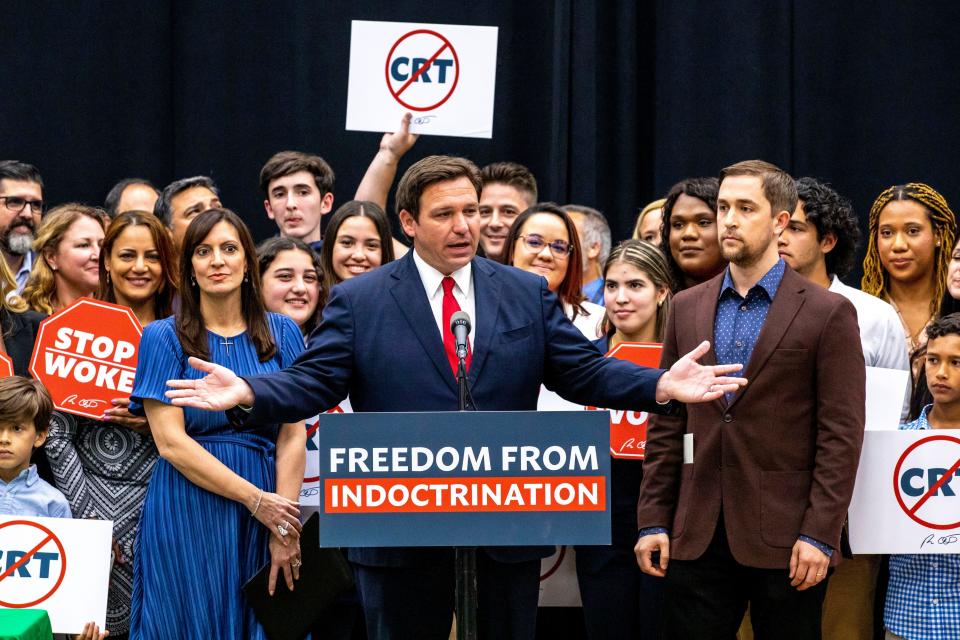'Election integrity,' an unfunded mandate for local communities | Editorial
- Oops!Something went wrong.Please try again later.
This editorial is the opinion of The Palm Beach Post Editorial Board, not the Post's newsroom.
Palm Beach County Elections Supervisor Wendy Sartory Link needs more money for next year's elections. It's not her fault. Her 53% budget increase request comes courtesy of an unfunded mandate shoved down the throats of local taxpayers by the state of Florida, whose leaders saw an "election-integrity" solution in search of a non-existent problem.
Gov. Ron DeSantis and the Republican-led Florida Legislature decided that "secure ballot intake stations," bureaucratic jargon for voter drop boxes, need more protection. Voters used to deposit mail-in ballots to unmanned drop boxes. No longer. State law now requires the intake stations be manned at all times, a cost that lawmakers ignored when shaping the current state budget. That burden, they assumed, would be picked up by the counties.

Our View: How the anti-election-fraud Governor cheated Florida voters | Editorial
The change, along with other anticipated costs, forced Link to ask county commissioners for $34 million, a $12 million increase over the previous budget. No commissioner objected, a good start to what should be a quick budget approval. The integrity of the 2024 elections is crucial and cannot be sacrificed by doing them on the cheap.
“That is what these people repeatedly say they want — safe and secure elections," Link told Post reporter Mike Diamond. "It is not cheap to have safe and secure elections. We are trying to do things the right way.”
It's not like the county commission has much choice. The 2024 election cycle will be huge — municipal races and presidential primaries in the spring, county, federal, state and local primaries in the summer, culminating in the presidential race in November's general election. With so many races, ballots must be printed to reflect each race, voters must be properly registered and voting rolls scrutinized for accuracy. Poll workers must be hired and trained, early voting sites and election day voting precincts must be created and secured. These are just some of the responsibilities the elections supervisor must handle to ensure a successful election and adhere to state laws.
Unfortunately, doing things, as Link put it, "the right way," requires adjusting to the wrong approach taken by state leaders. Lacking any real evidence of notable election fraud in Florida, state leaders churned out more restrictions on voting, under the veneer of doing better, to tip the electoral process to their advantage.
In fact, it was Gov. DeSantis himself who once tweeted: “Florida is a model for the rest of the nation to follow.”
However, that hasn't stopped the Governor and his allies in the Legislature from constantly tweaking state election procedures, ever since former President Donald Trump lost re-election in 2020 and started spreading false claims of widespread voter fraud, even in the Sunshine State where Trump won handily.
SB 90, the 2021 measure that called for tighter drop box security and restrictions, is just one of several revisions to Florida election laws. A year later, the Legislature passed and the Governor signed a measure that created an elections security force to investigate voter fraud, a unit with police powers that critics say only intimidate voters, particularly ex-felons who believe their voting rights have been restored.
Vote-by-mail procedures were also tightened last year, by limiting the number of signed and sealed ballots that a person can possess, an effort to limit the collecting of ballots by third-party groups. Earlier this year, the state enacted an elections bill that bolstered the 2022 "election police" law, increased fines on voter registration groups that run afoul of state election laws and reduced the time supervisors of elections have to scrub voter rolls of dead and ineligible voters.
"Election integrity" may be the claim coming out of the state capitol but it's hard to overlook how the new laws that largely restrict access to the ballot box aren't simply legal means to encroach and suppress the vote. They're also impacting local elections supervisors and county commissions across the state with a new burden — higher costs.
To comply with these changes, Florida's supervisors of elections will need the resources to ensure that their elections are viewed as both accurate and credible. They must also meet the rigors of state law knowing that money won't print itself. The reality is that elections cost, and if the state won't cover the procedures it mandates, local communities will have to.
This article originally appeared on Palm Beach Post: Florida's move to improve elections will cost local communities

